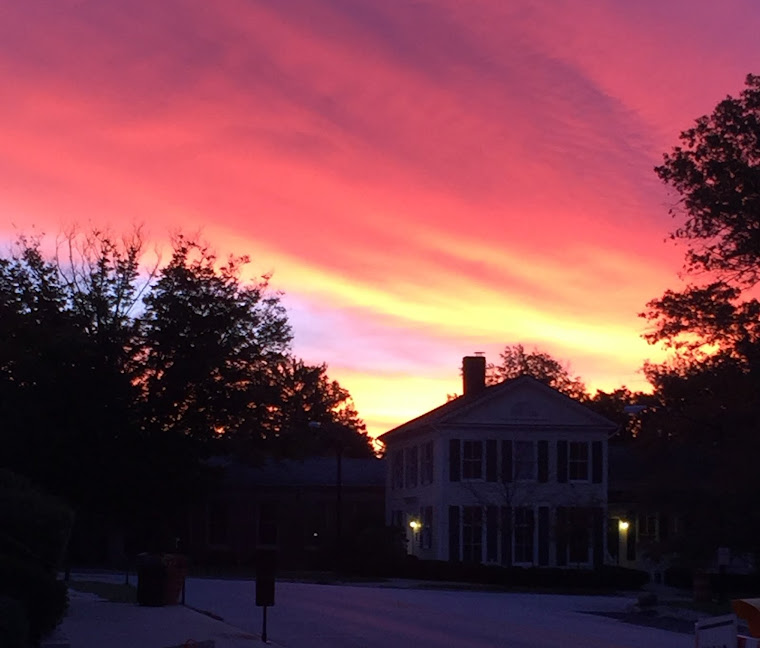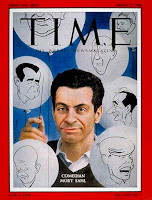A couple of days ago marked the anniversary of the publication of the 1st Harry Potter novel in 1997. And I began "serializing" a speech I made at Western Reserve Academy about my experiences reading HP. In that first installment I wrote about how I'm an obsessive reader of an author's complete works, and in today's excerpt I give the example of Anthony Trollope ... soon I'll get to HP more explicitly! Reminder; I delivered this speech at Western Reserve Academy on May 4, 2012.
And now a little
story … just to illustrate the dimensions
of this problem …
At the end of
the 1995–1996 school year, an Aurora student gave me a gift certificate to a
local bookshop. And on a lovely early
summer’s eve, unaware I was about to make a purchase that would alter our next decade, Joyce and I drove to that bookshop.
On a display
table, I noticed some paperbacks of the novels of Anthony Trollope (1815–1882),
a writer I’d never read. I picked up The Warden. Around two hundred pages. (Not too long, I thought.) Tried the first sentence: The Rev. Septimus Harding was, a few years
since, a beneficed clergyman residing in the cathedral town of —, let us call
it Barchester. (Not bad.)
So I bought all
six Trollopes there, took them home, put them in a thick stack on the coffee
table in front of the couch where I love to read (and sometimes sag into a nap). And there they sat for over a year, unopened,
disappearing from my notice.
Then,
unaccountably, early in July 1997—about the time Harry Potter was invading
America—I picked up The Warden once
again. Started reading. Loved it.
Was surprised at how funny Trollope is.
Was surprised to discover that Trollope’s characters—like Dickens’—are
profoundly unique and human.
Archetypal. The original Platonic
forms of people whose shadowy copies now walk the earth.
I splashed
through those six Barsetshire novels, then leapt into the inviting pool of his
six Palliser novels. Oh God they were
good, those first twelve Trollopes. And
they were also easy to find—most of the big bookstores in the area had
them. But then I had to locate the other thirty-five titles. And I soon developed a dead-on, infallible
way to assess a bookstore’s quality. The
Trollope Test. It’s simple: (1) find the
Fiction section; (2) find the T’s;
(3) count the number of different
Trollope titles on the shelf. The larger
the number, the better the store. No
exceptions.
But did I have
to buy all forty-seven novels? Own them? Haven’t I heard of a library? Well, yes, but I am
as much a collector as reader; I wanted all forty-seven on my shelf, lined up like railcars. And here they are … [AT THIS POINT 47 MEMBERS
OF THE WRA SENIOR CLASS STOOD AND SHOWED THE 47 BOOKS]
When I decided early
in 2001 that I was going to read the remaining thirty or so in the order that
Trollope wrote them, well, then things got interesting. His first novel, The Macdermots of Ballycloran (1847) I found on Amazon.uk. But some I simply could not find new, so I haunted
the used-book sites on the Web, one time paying—for a paperback of Marion Fay—$38.07.
Throughout the
late 1990s, across the millennium, I always
had a Trollope novel in progress. I kept
the latest title by my bed, read a chapter or so a night; when I traveled
anywhere, I made certain I had at least one with me. And because I never—never!— went anywhere without Trollope, he was my companion on
trips and errands more frequently than anyone else, Joyce included. I read on airplanes, in physicians’ and
dentists’ waiting rooms, in coffee shops, the auto repair place, the barbershop. In late November 1999, I was reading Can You Forgive Her? at the bedside of
my poor dying father. In October 2003 I
was reading Miss MacKenzie when I was
struck with Bell’s palsy. In February
2005 I read from Ralph the Heir in a
maternity waiting room while our first grandson, Logan, was arriving. A few months later, Trollope’s Harry Heathcote of Gangoil, an
Australian adventure novel, helped me through my rehab after cancer surgery. In January 2006 while visiting my mother, who
was recovering from a near-fatal car accident, I read Is He Popenjoy?—a novel about a false heir.
In Trollope I
read about Members of Parliament—and wealthy folks—and landed folks who’ve
fallen on hard times—and grumpy old men who don’t want to leave their estates
to their no-good sons—and vicious women (mothers
even!) who insist on their own way, who, though bounded in nutshells, count
themselves queens of infinite space—and fox-hunters and shooters of game
birds—and clueless but arrogant Americans—and young men who must learn about
the importance of your word, your honor, about how to love—and profoundly
moral young women whose values eventually (though not always) educate and snare
the right young man, young women whose goodness can remind some flint-headed
grouch what the human heart looks like, what, in fact, it is for.
*
As I was moving
slowly back through the railcars of Trollope’s work, I knew I would eventually step into the caboose—the last—his
posthumous The Landleaguers. A dreadful prospect. So when the end that had once seemed endless came into view, I began a sort of delaying
action.
Yes, I sometimes
slowed the Trollope train, stepped off at a local diner, and ate some famous
literary food, reading some celebrated books that I’d long implied (okay: claimed) I’d already read. First on the
menu was what, in the end, I believed to be the most nutritious of all—Proust’s
In Search of Lost Time. Then came some other novels I’d sort of lied
about reading: War and Peace, Don Quixote, Anna Karenina, Tristram
Shandy, The Red and the Black, Fathers and Sons. But all too soon, crumbs and scraps of Cervantes
and Tolstoy sprinkled across my plate, I was back on the Trollope train with no
more scheduled stops.
Now just four
remained, including the last he lived to see published, The Fixed Period, a futuristic tale about a time when the
government has established the maximum legal length of human life—sixty-seven
years. If you’re still alive at 67(my age now!), you get institutionalized
and eventually dispatched, though nicely, sometime before your sixty-eighth
birthday. Next were the last two novels
he completed—An Old Man’s Love, in
which an older man (he’s fifty!) loses in love to a younger
rival, and Mr. Scarborough’s Family,
about a resentful dying man who tries to manipulate the inheritance laws. Last of all … the novel Trollope was working
on when he died, the unfinished The
Landleaguers, which is perhaps his most political and bitter story. (Among its outrages: the murder of a child.)
 |
| my copy |
To be continued ...

























